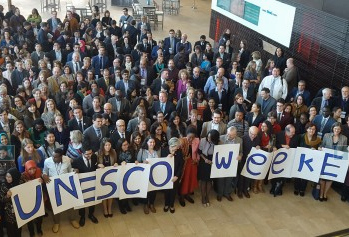Standardised tests and Global Citizenship: a flawed relationship?
The UNESCO Week for Peace and Sustainable Development is a reminder that governments have committed to universal education for sustainable development, global citizenship and human rights, a commitment made when governments signed up to the Sustainable Development Goals.

“Education for sustainable development and global citizenship education can only take root in our curricula and become core elements of our school systems, when we empower teachers, protect their professional freedoms, and give them the space and time to carry out their tasks,” said Education International (EI) General Secretary Fred van Leeuwen at the official opening of the UNESCO Week for Peace and Sustainable Development, in Ottawa, Canada, from 6-10 March.
“Too often teachers are boxed into situations that reduce them to content delivery agents and test score attendants rather than educators,” he said.
EI panel discussion
These developments around test scores and learning metrics were the focus of a panel hosted by EI, where government prioritisation of education for sustainable development, global citizenship and human rights was contrasted with the push for standardised assessment and global learning metrics.
The debate addressed some of the most controversial issues surrounding the Sustainable Development Goal 4 on quality education. Said Ould Voffal of the UNESCO Institute for Statistics highlighted the different objectives and purposes of assessments at different levels, and the necessity of having evaluation systems in place. There was broad agreement on the potential of assessments leading to policy interventions, but Professor Joel Westheimer of the University of Ottawa pointed out that they are often used for punitive purposes and to legitimise already designed policy reforms. Paulina Korsnakova of the International Association for the Evaluation of Educational Achievement called for a difference to be made between the tool itself and the ways in which the tool is used – or misused.
Shared concern
There was a shared concern about the marginalisation of subjects that are not included in the standardised assessments. Some considered this a strong argument in favour of assessments and metrics for education for sustainable development, global citizenship and human rights. Others argued that these issues are impossible to accurately capture in simplified global metrics and that other methods of evaluation and indicators of success are necessary.
Threats to quality education
Critical questions were also asked about the links between the commercialisation of education, privatisation and the testing business, and about the profitability of global learning metrics and testing. The deprofessionalisation of the teaching profession was also highlighted as a threat to education for sustainable development, global citizenship and human rights. Professional autonomy as well as training and different support structures were highlighted as key priorities moving forward.
The debate showed how challenging it is to deliver on a promise of universal education for sustainable development, global citizenship and human rightsin an environment where education systems and teachers are under increasing pressure – to showcase test scores as well as transformative pedagogies and world-improving practices. Indeed, there is an urgent need to challenge the ways in which metrics are used, and think of alternative ways in which governments can be held to account for their promise of quality education for all.
Source: Education International
- 434 reads
Human Rights
Ringing FOWPAL’s Peace Bell for the World:Nobel Peace Prize Laureates’ Visions and Actions

Protecting the World’s Cultural Diversity for a Sustainable Future

The Peace Bell Resonates at the 27th Eurasian Economic Summit

Declaration of World Day of the Power of Hope Endorsed by People in 158 Nations

Puppet Show I International Friendship Day 2020

